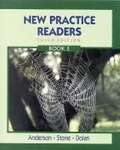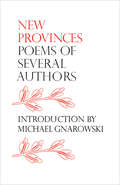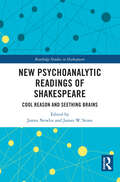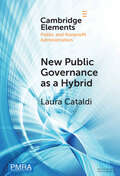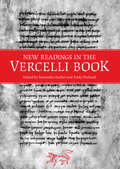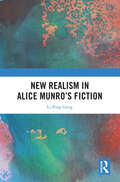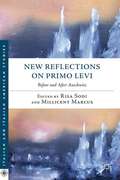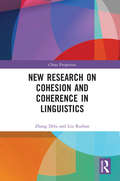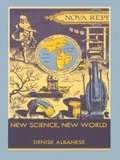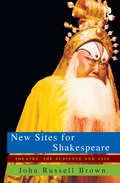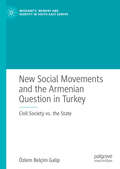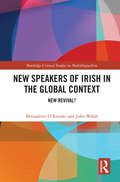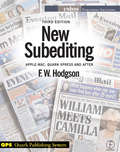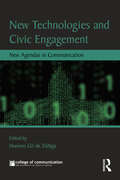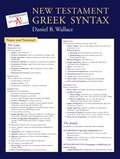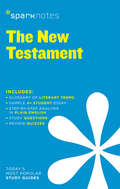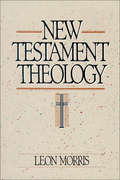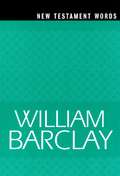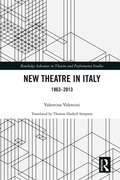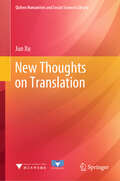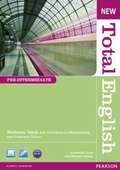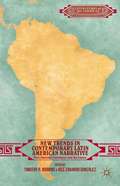- Table View
- List View
New Practice Readers (Third Edition): Book E
by Donald G. Anderson Clarence R. Stone Ellen Dolan"This book is one of a seven-book series. It is intended to provide reading interest along with the development of comprehension skills for readers who need additional practice material to achieve mastery. The controlled reading level of each book makes it possible to assign students to the text most suitable for individual reading comfort. Readabilities for this book are 5.0-5.8, consistent with the Dale-Chall Readability Formula. This book contains nine groups of articles in units labeled A-I. The subjects cover the major content fields listed below. 1. People and progress 2. Reptiles and sea life 3. Health and safety 4. Insects 5. Plants and products 6. Mammals and birds 7. Miscellaneous 8. Heroes and heroines 9. Instruments and measures."
New Provinces: Poems of Several Authors
by Douglas Lochhead Michael GnarkowskiWhen New Provinces first appeared in 1936, it represented four years of planning, argument, and compromise, and an additional two and a half years of correspondence and editorial preparation. This prolonged effort was brought to a successful end with the publication of a slim collection of verse, the work of six writers, Robert Finch, Leo Kennedy, A.M. Klein, E.J. Pratt, F.R. Scott, and A.J.M. Smith. At the time it was published it received little critical attention and had even less popular appeal; after nearly a year the book had sold only 82 copies, 10 of them to one of the contributors. Only E.K. Brown, writing for University of Toronto Quarterly in 1937, seemed to realize that New Provinces 'marked the emergence ... of a group of poets who may well have a vivifying effect on Canadian poetry.' Since that time this small volume has been recognized as a monument in Canadian literature, a singular event in a literary process which stemmed from the origins of Canadian modernism and its beginnings in Montreal, marking the first collective effort to introduce poets who came to represent the new establishment. Michael Gnarowski's introduction tells the fascinating story of the genesis of the idea for the book and the difficulties that were encountered.
New Psychoanalytic Readings of Shakespeare: Cool Reason and Seething Brains (Routledge Studies in Shakespeare)
by James Newlin and James W. StoneIt has been over two decades since the publication of the last major edited collection focused on psychoanalysis and early modern culture. In Shakespeare studies, the New Historicism and cognitive psychology have hindered a dynamic conversation engaging depth-oriented models of the mind from taking place. The essays in New Psychoanalytic Readings of Shakespeare: Cool Reason and Seething Brains seek to redress this situation, by engaging a broad spectrum of psychoanalytic theory and criticism, from Freud to the present, to read individual plays closely. These essays show how psychoanalytic theory helps us to rethink the plays’ history of performance; their treatment of gender, sexuality, and race; their view of history and trauma; and the ways in which they anticipate contemporary psychodynamic treatment. Far from simply calling for a conventional "return to Freud," the essays collected here initiate an exciting conversation between Shakespeare studies and psychoanalysis in the hopes of radically transforming both disciplines. It is time to listen, once again, to seething brains.
New Public Governance as a Hybrid: A Critical Interpretation (Elements in Public and Nonprofit Administration)
by Laura CataldiThis Element focuses on New Public Governance as one of the major administrative narratives of our times. It offers a critical interpretation of NPG as a hybrid tool for management, governance, and reform, arguing that NPG coexists with and is likely to gradually merge into New Public Management. Several arguments support the 'continuity and hybridization' hypothesis, whereby the transition from NPM to NPG occurred through the retention of key elements and a layering and sedimentation process. These arguments challenge the “linear substitution” hypothesis, accounting for NPM's persistence and dominance. The Element develops a new interpretation of NPG and discusses the challenges that NPG poses. Finally, it shows that exploring hybridity is critical for evaluating the potential of NPG in terms of a shift in public administration and understanding governance trajectories and reform scenarios.
New Readings in the Vercelli Book
by Samantha Zacher Andy OrchardThe late tenth-century Vercelli Book (Vercelli, Biblioteca Capitolare CXVII) contains one of the earliest surviving collections of homilies and poetry in the English language. The manuscript's combination of poetry and homiletic prose has generated intense scholarly debate, and there is no consensus concerning the original purpose of the compiler.New Readings in the Vercelli Book addresses central questions concerning the manuscript's intended use, mode of compilation, and purpose, and offers a variety of approaches on such topics as orthography, style, genre, theme, and source-study. The contributors include some of the foremost Vercelli experts, as well as the two most recent editors of the homilies. The remarkable essays in this volume offer the first sustained literary analysis of both the poetry and prose texts of the Vercelli Book, providing important new perspectives on a dynamic and valuable historical document.
New Realism in Alice Munro’s Fiction
by Li-Ping GengThe book studies Alice Munro’s inheritance of and contribution to Realism in fiction. Nobel Prize winner Munro follows the empirical tradition of Enlightenment and draws on her life as a daughter, wife, mother, and professional writer while composing her fiction to reflect Canadian reality. She infuses her intellectual, moral, and aesthetic vision into her stories. This study analyzes her innovative realism in three respects: her views on feminism and women’s issues, her firm yet sympathetic moral stance, and her reconstitution of traditional and modernist (postmodernist) methods of portraying character in time and space. Munro’s brand of realism is underpinned by her philosophical perception, her level-headed morality, her dialectical mind, and her versatile narrative style. This monograph, a voice from China, offers a deep philosophical reading of Munro. Students of the Canadian author, graduate or undergraduate, may find this book useful.
New Reflections on Primo Levi
by Risa Sodi Millicent MarcusPrimo Levi's hold on scholarly, critical and public attention grows with the passing of time. He commands a position of prominence in discourses ranging across the disciplines of Holocaust studies, Jewish studies, Italian literature, politics, history and philosophy. Certain of his concepts (the "grey zone") or certain concepts popularized through his works (the Musulmann phenomenon) play a significant role in contemporary intellectual discourse. In addition, Levi's reflections on the act and the possibility of witness, and of recounting trauma, are increasingly cited by a range of thinkers. This book presents a baker's dozen of interpretative keys to Levi's output and thought. It deepens our understanding of common themes in Levi studies (memory and witness) while exploring unusual and revealing byways (Levi and Calvino, or Levi and theatre, for example). Of special interest and utility are the chapters that situate his thought within wider contexts: his epistemological connection to ancient Greeks, and his contributions to Holocaust phenomenology.
New Research on Cohesion and Coherence in Linguistics (China Perspectives)
by Zhang Delu Liu RushanThe study of text cohesion and coherence has been a topic of heated discussion in Linguistics since the 1990s. Western linguists have developed two major theoretical frameworks to describe the relationship between the two concepts: one posits that cohesive devices are important means to ensure cohesion; the other argues that coherence does not rely on cohesion. Yet neither has complete explanatory power over reality; nor can they solve real-life problems. This title proposes a creative, concrete, and highly operational theoretical model that unites cohesion and coherence using authentic English or Chinese examples. The authors clarify the concepts of coherence and expand the scope of the research by focusing on a variety of internal and external factors, such as psycho-cognitive and socio-cultural factors. Moreover, the authors propose that the new theoretical paradigm can be applied to a range of other disciplines, including translation and foreign language teaching. This title has been one of the most cited works on cohesion and coherence in China. Students and scholars of discourse analysis, linguistics, and language education will find this an invaluable reference.
New Science, New World
by Denise AlbaneseIn New Science, New World Denise Albanese examines the discursive interconnections between two practices that emerged in the seventeenth century--modern science and colonialism. Drawing on the discourse analysis of Foucault, the ideology-critique of Marxist cultural studies, and de Certeau's assertion that the modern world produces itself through alterity, she argues that the beginnings of colonialism are intertwined in complex fashion with the ways in which the literary became the exotic "other" and undervalued opposite of the scientific.Albanese reads the inaugurators of the scientific revolution against the canonical authors of early modern literature, discussing Galileo's Dialogue on the Two Chief World Systems and Bacon's New Atlantis as well as Milton's Paradise Lost and Shakespeare's The Tempest. She examines how the newness or "novelty" of investigating nature is expressed through representations of the New World, including the native, the feminine, the body, and the heavens. "New" is therefore shown to be a double sign, referring both to the excitement associated with a knowledge oriented away from past practices, and to the oppression and domination typical of the colonialist enterprise. Exploring the connections between the New World and the New Science, and the simultaneously emerging patterns of thought and forms of writing characteristic of modernity, Albanese insists that science is at its inception a form of power-knowledge, and that the modern and postmodern division of "Two Cultures," the literary and the scientific, has its antecedents in the early modern world.New Science, New World makes an important contribution to feminist, new historicist, and cultural materialist debates about the extent to which the culture of seventeenth-century England is proto-modern. It will offer scholars and students from a wide range of fields a new critical model for historical practice.
New Sincerity: American Fiction in the Neoliberal Age (Post*45)
by Adam KellyThe years 1989–2008 were an era of neoliberal hegemony in US politics, economy, and culture. Post*45 scholar Adam Kelly argues that American novelists who began their careers during these years—specifically the post-baby boom generation of writers born between the late 1950s and early 1970s—responded to the times by developing in their fiction an aesthetics of sincerity. How, and in what way, these writers ask, can you mean what you say, and avow what you feel, when what you say and feel can be bought and sold on the market? What is authentic art in a historical moment when the artist has become a model for neoliberal subjectivity rather than its negation? Through six chapters focused on key writers of the period—including Susan Choi, Helen DeWitt, Jennifer Egan, Dave Eggers, George Saunders, Dana Spiotta, Colson Whitehead, and David Foster Wallace—the book explores these central questions while intervening critically in a set of debates in contemporary literary studies concerning aesthetics, economy, gender, race, class, and politics. Offering the capstone articulation of a set of influential arguments made by the author over a decade and more, New Sincerity constitutes a field-defining account of a period that is simultaneously recent and historically bound, and of a generation of writers who continue to shape the literary landscape of the present.
New Sites For Shakespeare: Theatre, the Audience, and Asia
by John Russell BrownIn the course of exploring the theatrical cultures of South and East Asia, eminent Shakespeareanist John Russell Brown developed some remarkable theories about the nature of performance, the state of Western 'Theatre' today, and the future potential of Shakespeare's plays. In New Sites for Shakespeare he outlines his passionate belief in the power of theatre to reach mass audiences, based on his experiences of popular Asian performances. It is a personal polemic, but it is also a carefully argued and brilliantly persuasive study of the kind of theatrical experience Shakespeare's own contemporaries enjoyed. This is a book which cannot be ignored by anyone who cares about the live performing arts today. Separate chapters consider staging, acting, improvisation, ceremonies and ritual, and an analysis of the experience of the audience is paramount throughout.
New Social Movements and the Armenian Question in Turkey: Civil Society vs. the State (Modernity, Memory and Identity in South-East Europe)
by Özlem Belçim GalipThis book explores and comparatively assesses how Armenians as minorities have been represented in modern Turkey from the twentieth century through to the present day, with a particular focus on the period since the first electoral victory of the AKP (Justice and Development Party) in 2002. It examines how social movements led by intellectuals and activists have challenged the Turkish state and called for democratization, and explores key issues related to Armenian identity. Drawing on new social movements theory, this book sheds light on the dynamics of minority identity politics in contemporary Turkey and highlights the importance of political protest.
New Speakers of Irish in the Global Context: New Revival? (Routledge Critical Studies in Multilingualism)
by John Walsh Bernadette O'RourkeThis volume is the first full-length publication to systematically unpack and analyze the linguistic practices and ideologies of "new speakers" specifically in an Irish language context. The book introduces the theoretical foundations of the new speaker framework as it manifests itself in the Irish setting, describes its historical precedents, and traces its evolution to today. The book then draws upon a rich set of data and research methods, including participant observation and ethnographic fieldwork to examine the new speaker phenomenon in Irish in greater detail. Areas of analysis include new speakers’ language practices and usage and the ways in which they position their linguistic identities both within their respective communities and in juxtaposition with "native" speakers. While the book’s focus is on Irish, the volume will contribute to a greater understanding of new speaker practices and ideologies in minority language contexts more generally, making this key reading for students and scholars in sociolinguistics, applied linguistics, language policy and planning, anthropology, and Irish studies.
New Subediting: For Quark Users
by F W HodgsonNew Subediting gives a detailed account of modern editing and production techniques. Its aim is both to help the young subeditor and to spell out to the newcomer to newspaper journalism what happens between the writing of news stories and features and their appearance in the newspaper when it comes off the press. In this age of technological change the quality of the subbing has never been more important to a successful newspaper. The careful use of typography, pictures, graphics and compelling headlines and the skillful handling of text coupled with good page planning, all help to give character,style and readability.This book examines, and draws lessons from, work in contemporary newspapers in editing and presentation; it defines the varied techniques of copytasting, of editing news stories and features, of styles of headline writing and the use of typography to guide and draw the attention of the reader. It takes into account developments in the use of English as a vehicle of mass communication in two important chapters on structure and word use; and it shows how to get the best out of the electronic tools now available to subeditors.It also reminds journalisis that, however advanced the tools, a newspaper is only as good as the creative skills of those that write, edit and put it together.
New Tech, New Ties
by Rich LingThe message of this book is simple: the mobile phone strengthens social bonds among family and friends. With a traditional land-line telephone, we place calls to a location and ask hopefully if someone is "there"; with a mobile phone, we have instant and perpetual access to friends and family regardless of where they are. But when we are engaged in these intimate conversations with absent friends, what happens to our relationship with the people who are actually in the same room with us? In New Tech, New Ties,Rich Ling examines how the mobile telephone affects both kinds of interactions--those mediated by mobile communication and those that are face to face. Ling finds that through the use of various social rituals the mobile telephone strengthens social ties within the circle of friends and family--sometimes at the expense of interaction with those who are physically present--and creates what he calls "bounded solidarity." Ling argues that mobile communication helps to engender and develop social cohesion within the family and the peer group. Drawing on the work of Emile Durkheim, Erving Goffman, and Randall Collins, Ling shows that ritual interaction is a catalyst for the development of social bonding. From this perspective, he examines how mobile communication affects face-to-face ritual situations and how ritual is used in interaction mediated by mobile communication. He looks at the evidence, including interviews and observations from around the world, that documents the effect of mobile communication on social bonding and also examines some of the other possibly problematic issues raised by tighter social cohesion in small groups.
New Technologies and Civic Engagement: New Agendas in Communication (New Agendas in Communication Series)
by Homero Gil de Zuniga NavajasThis volume contributes to the extant and prolific New Agendas in Communication Series from one of the most salient perspectives within the field of Communication: New Technologies and Civic Engagement. The impact of the Internet and other technological advances are constantly referred to at most junctures of today's Communication research agendas. The area of Political Communication is not immune to this trend. The effects of the Internet and digital media on today's political landscape, with a particular emphasis on enhancing individuals’ civic duties and engagement levels, are theme of concern at many of the most renowned journals in Communication and Political Science disciplines. First, this book pays attention to the overall impact of the Internet and people's use of digital media and new technologies to analyze civic life at large, reconceptualizing what citizenship is today. Secondly, and more specifically, participants shed light over the intersection of a number of current new agendas of research in regards to some of the most rapidly growing technological advances (i.e., new publics and citizenship), and the emergence of sprouting structures of citizenship. The volume shows the implications that new technological advances carry with respect the possibilities, patterns and mechanisms for citizen communication, citizen deliberation, public sphere and civic engagement.
New Technologies for Literacy and Adult Education: A Global Perspective
by Daniel A. Wagner Robert B. KozmaThis book analyzes two interconnected approaches to using ICT (Information and Communications Technologies) to support adult literacy and adult/basic education.
New Testament Greek Syntax Laminated Sheet: Companion To Basics Of New Testament Syntax And Greek Grammar Beyond The Basics (Zondervan Get an A! Study Guides)
by Daniel B. WallaceThis summary laminated sheet of Greek Grammar beyond the Basics and Basics of New Testament Syntax is perfect for students to review categories of uses and look over possibilities when doing exegesis of the New Testament.
New Testament SparkNotes Literature Guide (SparkNotes Literature Guide Series #47)
by SparkNotesNew Testament SparkNotes Literature Guide Making the reading experience fun! When a paper is due, and dreaded exams loom, here's the lit-crit help students need to succeed! SparkNotes Literature Guides make studying smarter, better, and faster. They provide chapter-by-chapter analysis; explanations of key themes, motifs, and symbols; a review quiz; and essay topics. Lively and accessible, SparkNotes is perfect for late-night studying and paper writing. Includes:An A+ Essay—an actual literary essay written about the Spark-ed book—to show students how a paper should be written.16 pages devoted to writing a literary essay including: a glossary of literary termsStep-by-step tutoring on how to write a literary essayA feature on how not to plagiarize
New Testament Theology
by Leon MorrisThis work is not a history of New Testament times, nor an account of New Testament religion. Nor does it proceed from a view that the New Testament was written as theology. We must bear in mind that the writers of the New Testament books were not writing set theological pieces. They were concerned with the needs of the churches for which they wrote. Those churches already had the Old Testament, but these new writings became in time the most significant part of the Scriptures of the believing community. As such, they should be studied in their own right, and these questions should be asked: What do these writings mean? What is the theology they express or imply? What is of permanent validity in them? We read these writings across a barrier of many centuries and from a standpoint of a very different culture. We make every effort to allow for this, but we never succeed perfectly. In this book I am trying hard to find out what the New Testament authors meant, and this not as an academic exercise, but as the necessary prelude to our understanding of what their writings mean for us today. -- From the Introduction
New Testament Words
by William BarclayBarclay traces the meaning of New Testament words in classical Greek, in the Septuagint, in Hellenistic Greek, and in the papyri. This volume covers all the words originally explained in Barclay's A New Testament Wordbook and More New Testament Words, and it includes an index providing access, by both Greek and English, to every mention of these words in The Daily Study Bible.
New Theatre in Italy: 1963–2013 (Routledge Advances in Theatre & Performance Studies)
by Valentina ValentiniNew Theatre in Italy 1963-2013 makes the case for the centrality of late-millennium Italian avant-garde theatre in the development of the new forms of performance that have emerged in the 21st Century. Starting in the Sixties, young artists and militants in Italy reacted to the violence in their streets and ruptures in the family unit that are now recognized as having been harbingers of the end of the global post-war system. As traditional rituals of State and Church faltered, a new generation of cultural operators, largely untrained and driven away from political activism, formed collectives to explore new ways of speaking theatrically, new ways to create and experience performance, and new relationships between performer and spectator. Although the vast majority of the works created were transient, like all performance, their aesthetic and social effects continue to surface today across media on a global scale, affecting visual art, cinema, television and the behavioural aesthetics of social networks.
New Thoughts on Translation (Qizhen Humanities and Social Sciences Library)
by Jun XuThis book represents the cutting-edge ideas on translation studies in recent years from China’s pioneer translator Xu Jun. The book discusses the following points: first of all the theoretical thinking of translation studies, second the translation methods and challenges in the new era, and then the translation spirit and critical exploration, followed by translation education, translation value, and others. It serves as a reference book for scholars and readers who are dedicated in thoughts about developing China’s translation studies.
New Trends in Contemporary Latin American Narrative
by Timothy R. Robbins José Eduardo GonzálezExamining a rich new generation of Latin American writers, this collection offers new perspectives on the current status of Latin American literature in the age of globalization. Authors explored are from the Boom and Postboom periods, including those who combine social preoccupations, like drug trafficking, with aesthetic ones.
